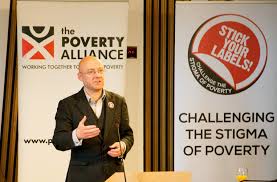Work TV
Watch our TV Channel dedicated to the ‘World of Work’. Explore our video library for informative videos featuring career opportunities at leading companies, franchising opportunities, further education and recruitment professions and their services.
Simon Collyer
Scots Oppose Sunday Trading Plans
Scottish National Party MPs will oppose government plans to introduce Sunday Trading in England and Wales, to protect the rights of workers in Scotland.
The SNP group have agreed this evening to vote against the proposals in the UK government’s Enterprise Bill in the House of Commons tomorrow as the bill fails to protect the premium pay currently received by employees in Scotland. While there has been Sunday Trading in Scotland for some time, employment rights associated with proposed protections to workers who choose not to work on Sundays remain reserved to the UK government under the Employment Rights Act 1996. Commenting after the SNP’s group meeting this evening, SNP Economy spokesperson Stewart Hosie MP said: “Protecting Scottish workers has been paramount to our decision to oppose the government’s plans on Sunday Trading. "We have had Sunday Trading in Scotland for some time and the SNP has never been opposed to it, however our concerns here are rooted in the knock-on impact to Scottish workers who would be at risk of pay cuts - many of whom are already suffering from George Osborne’s cuts to tax credits and other in work support. "SNP MPs have considered all sides in this debate and our decision has been made so workers in Scotland are protected.
“The SNP welcomed the additional employee protections brought forward by the UK Government which amends the Employment Rights Act to protect any worker from being forced into working on a Sunday – however they do not go far enough. There is no meaningful means of pro-active enforcement of the proposed legislation. “The SNP are supporters of Sunday trading – we think in principle it can be a good thing – but we are clear that it should not be happening on the back of often low paid shop workers in Scotland and throughout the UK.”
Happy International Women’s Day
Contributions to the debate around women’s rights and opportunities, especially in the workplace, have been ramping up over the past week. Here are a few of the most local and notable.
European Roundtable of Industrialists: Roundtable reps tell me the average share of women in leadership positions in their member companies has increased, but only by around 1% over the last year. BMW has beaten their 2020 workforce target already (they sought a comparatively low 17 percent share of female employees in this male-dominated sector, and have hit 18 percent.)
World Economic Forum: Women get exploited because domestic workers, who are nearly all women, have some of the fewest protections in the world.
Amnesty: 1 out of every 3 women alive today was married before she was 15.
European Commission: gender pay gap is closing; still 16 percent. The gap is less than 5 percent in Slovenia and Malta bit more than 20 percent in Estonia, Austria, Czech Republic, Germany and Slovakia.
French Food is Not Rubbish
Large French supermarkets will soon be prohibited by law from throwing away or destroying unsold food. Instead, they will have to sign donation contracts with charities such as food banks.
They will also be obliged to stop deliberately spoiling food in order to prevent it from being eaten by people foraging in stores’ bins.

International Women’s Day: SNP Present David Cameron with “Checklist”
“David Cameron must take action on key issues affecting women”
The Scottish National Party has provided David Cameron with a “checklist” on International Women’s Day, urging him to take action on key issues affecting women.
SNP Women and Equalities spokesperson Angela Crawley MP has written to the Prime Minister setting out five key areas where the UK government can and should take urgent action to improve the lives of women in the UK.
• Scrap the Rape Clause
• Close the Gender Pay Gap
• Protect Maternity Pay and End Maternity Discrimination
• Commit to Ending Violence Against Women
• Scrap the Tampon Tax
Scrap the Rape Clause
New government proposals due to commence in 2017 will require a woman, who has a third child as the result of rape, to justify her position to a government official in order to avoid losing tax credits.
The government has failed to provide any details on how the ‘rape clause’ will be implemented, or how a government offices intend to prove a woman has been raped.
As part of a campaign led by SNP MP Alison Thewliss, MPs representing nine parties in the House of Commons - including the Conservatives - signed a joint letter to the Prime Minister calling upon the Government to ‘unequivocally’ scrap the tax credits rape clause.
Violence Against Women Convention
The SNP is continuing its call to David Cameron to ratify the Istanbul Convention- a European Council convention which legislates for the coordination of policies between government, local authorities and charities working to combat violence against women.
In 2012, the UK signed-up to the Convention and agreed to implement a series of coordinated measures, however to date the UK Government has failed to ratify it. Angela Crawley MP will be taking the issue to the UN Women’s Convention in New York next month. It follows a letter to the Prime Minister from SNP MP Gavin Newlands – co signed by several campaign groups- criticising the UK government for “stalling over women’s rights.”
Tampon Tax
Angela Crawley MP has called on David Cameron to negotiate with Europe to abolish the VAT charge on sanitary products. George Osborne announced that instead of forcing the European Commission's hand to lift the unfair VAT, women will continue to pay the rate, with the UK government instead diverting the funds - £15 million a year - to women’s charities. The announcement was widely condemned, and the SNP argued that women still have to pay this unfair tax and women alone should not have to financially support such causes - they should be adequately supported by the government.
The SNP has consistently opposed the VAT charge on sanitary products and was the only major party at the 2015 General Election to include a pledge to abolish the tax in its manifesto.
Gender Pay Gap
The Prime Minister has pledged to end the gender pay gap in a generation, yet in the Annual Survey of Hours and Earnings, the gender gap in the UK only fell by 0.8 percentage points, to 9.5 percent, compared with Scotland, where the gap dropped 1.8 points, to 7.5 percent.
The Scottish Government plan to legislate to ensure that public organisations with more than 20 employees will have to publish information on the difference in pay between men and women. Right now only public authorities with more than 150 employees are required to publish this information. Proposed UK-wide regulations will only require employers with over 250 employees to publish their data.
The proposal for a UK wide gender-pay audit was in the SNP’s manifesto and would have been proposed for the years 2016/17. The UK Government have stalled the plans and the legislation is not due to come into force until 2018.
The SNP have called for the Government to introduce the gender-pay audits this year.
Maternity Pay and Discrimination
Unlawful maternity and pregnancy discrimination is now more common in Britain’s workplaces than ever before, with as many as one in nine pregnant women forced out of their job each year.
In July 2013 the UK Government introduced employment tribunal fees of up to £1,200 which are amounting a barrier to women and a charter for rogue employers.
The SNP have called for the abolition of tribunal fees to give pregnant women the right to challenge discrimination.
SNP Women and Equalities spokesperson Angela Crawley MP said:
“David Cameron can and should take action on these key issues to improve the lives of women in the UK.
“From taking steps to close the gender pay gap, to ensuring no woman should have to prove she has been raped to claim tax credits, the UK government should take action on these issues as a matter of urgency.
“SNP MPs have been campaigning on these five issues over the past few months, but as we take stock on International Women’s Day, not enough has been done.”
Pension Plans Dropped
Chancellor George Osborne has dropped plans to end or alter tax relief on pension contributions. A proposed scheme would have scrapped upfront relief, worth an estimated £21bn to savers, but made pension pot withdrawals tax free.
An alternative option was to set a flat rate of tax relief, which may have been unpopular with higher earners. Campaigners said he had missed a "huge opportunity" to tackle pension inequality and help the lower paid.
George Osborne, will deliver the nextBudget on Wednesday 16th March 2016.
One Million Jobs Could Go in Retail
Greater productivity' but fewer jobs in changing UK retail market by 2025, says the British Retail Consortium (BRC)
Almost one million UK retail jobs could disappear by 2025 due to the continuing growth of e-commerce and closure of physical shops, the British Retail Consortium (BRC) has warned.02 Mar 2016
The industry body said that government policy with "sound intentions", including the impact of a higher national minimum wage and the 'apprenticeship levy' which will be payable by the largest UK employers, would increase labour costs by as much as £3 billion a year and increase the pace of change.
The impact of this would be particularly striking in "areas that are already economically fragile" including Wales and the north of England, where are many as 30% of the 74,000 shop closures projected nationwide could happen. The BRC called on the government to "re-balance the burden of taxation" on physical retail through reforming business rates, and to give the Low Pay Commission stronger oversight of the planned National Living Wage (NLW).
"Individual retailers will find their own paths to 2020 and beyond but, from an industry perspective, we hope to see technology and competition resulting in better experiences for the customer and better jobs for those working in retail," said Helen Dickinson, chief executive of the BRC.
"From a government perspective the more significant insights in this report lie in where and how these changes may happen and the differential impact they are likely to have on people and places across the country and we would like to work with government to manage the impact of the changes on the most vulnerable," she said.
Businessman Theo Paphitis, chair of Ryman Stationery and Robert Dyas, said that the report showed that "without a major re-think by the government around the business rates system and the apprenticeship levy, together with careful consideration of the NLW, the trading conditions for retail are set to worsen significantly".
"The most vulnerable people and places will be impacted and we are keen to play our part in implementing these policies, but the government will need to work hard to mitigate their impact," he said.
Retail is the largest private sector employer in the UK, with three million people currently working in retail and wholesale businesses. This number was already falling and could drop as low as 2.1 million by 2025, predominantly due to "ongoing structural change" as a result of the growth of e-commerce. However, the pace of change would be "accelerated" by the increasing cost of labour and retailers increasing their investment in digital at the expense of physical retail, according to the BRC's report.
The shift to digital would create new opportunities, while the BRC predicted that the remaining physical retail jobs would be "more productive and higher earning", with a wide variety of roles and better opportunities for training. However, the impact of the job losses would be more severe in parts of the country where wages were already low, while some of the people affected by changing roles would be "those who may find it hardest to transition into new jobs that are created", the BRC said in its report.
"The [NLW] is planned to reach 60% of median earnings nationally by 2020," the BRC said. "This will have little or no impact in affluent areas, especially London and south-east, where starting rates are often at or above this level already. However, £9 per hour by 2020 is forecast to be equivalent to at least 70% of median earnings in many other parts of the country, and will force employers to consider if they can afford those roles. This will be most acute in regions where economic growth is weakest."
The percentage of retail employees on 'low pay', defined as less than 1.2 times the minimum wage, has risen steadily since 1990 to around 57%, compared to around 21% of all UK employees. A higher national minimum wage (NMW) of £7.20 per hour, dubbed the 'national living wage', will be introduced next month for all employees aged 25 or over, and the government's intention is for this to rise to £9 per hour by 2020. The BRC said that although "the rising incidence of low pay within retail suggests that pay does need to be addressed", the government had "underestimated" the impact of the policy on employment.
The need to reform business rates, which now make up 42% of the taxes paid by retailers, was now "urgent", the BRC said.
"Retail is committed to playing its part but the balance of business taxation has become increasingly weighted against people and property intensive businesses, which is contributing to store closures and unemployment," it said in its report.
The government should also "phase in" the apprenticeship levy, which will be charged at 0.5% of the wage bills of the largest businesses from 2017; and provide further clarity over how the funds raised will be allocated, the BRC said.

Route Map to Ending Hunger
We recently spoke to Andrew Forsey - amongst various roles, Andrew works as an aide to Frank Field MP, Chair of the DWP Select Committee - about the high cost of bank charges, broadband and telephony costs. This action on our part followed on from our Santander article critisizing the bank for multiple charges on direct debits that failed to go through (*3). Claiments having been forced into a DD agreement by a utility vendor, who then find their income such as JSA, out of sync when these charges are due. It can be difficult to put aside money if an emergency arises. Not uncommon if you are surviving on a rock bottom income.
We recieved this generous reply.
+++
Dear Simon,
Thanks for your note. Whilst I understand the Committee does not currently have any plans to investigate this area, Frank has taken it up through the All-Party Parliamentary Group (APPG) on Hunger.
He has written, for example, to the utilities and mobile phone regulators, as well as individual companies, asking whether they might pilot a ‘breathing space’ mechanism for people who are struggling to afford their monthly payments. You can read more about the APPG’s work on this front in its most recent report which I have attached.
With best wishes,
Andrew
+++
We have attatched the report: A route map to ending hunger, below.
BBC License Fee Under Review
On iPlayer, you can watch television just a short while after it was first broadcast live and legally be allowed to do so. This was video on demand rather than broadcast television. If you only ever watch on demand programmes, you don’t need a TV Licence. On demand includes catch-up TV, streaming or downloading programmes after they’ve been shown on live TV, or programmes available online before being shown on TV.
John Whittingdale, the culture secretary, has said that the licence fee would be extended so it no longer applied only to live television viewers, and he would look bring forward this legislation ‘as soon as practicable’.
It costs £145.50 for a colour and £49.00 for a black and white TV Licence. In some cases, you may be entitled to a reduced fee TV Licence:
| Aged 74 and over | You’re entitled to a free over 75 TV Licence when you turn 75. If you‘re 74, you can apply for a short-term licence to cover you up to your 75th birthday. |
| Care home residents | Residents may qualify for a discounted TV Licence fee of £7.50. Residents, staff and residents’ families all need a separate licence for their own living area. |
| Registered as blind | You’re entitled to a 50% reduction in your TV Licence fee if you’re certified as blind (severely sight impaired). |
Bad news for those for whom £145.50 is a lot of money.
DWP Select Committee Live
DWP Select Committtee Live
-
-
Witnesses: Rt Hon Lord Willetts, Executive Chair, The Resolution Foundation (formerly Minister of State for Universities and Science), Rt Hon Steve Webb, former Pensions Minister
Scottish Poverty Alliance Backs SNP
The Poverty Alliance has backed the SNP’s call to put dignity and respect at the heart of Scotland’s social security system.
Speaking on Good Morning Scotland, Director of the Poverty Alliance Peter Kelly said that: “When we talk to people who’re living on low incomes, whether they’re in work or whether they’re out of work, one of the things they talk to us about all the time is that sense of being treated with dignity that sometimes just doesn’t happen enough.”
The Scottish Parliament will be responsible for £2.7bn of social security payments, with power over 11 existing benefits including Disability Living Allowance and Carers Allowance.
In December the Scottish Government set out the principles it would follow on social security, putting dignity and respect at the heart of devolved welfare.
The Scottish Government has already confirmed it will use its new powers to:
• Increase Carer’s Allowance to the same rate as Jobseeker’s Allowance
• Abolish the bedroom tax
• Introduce flexibilities around how Universal Credit is paid including giving people choice to be paid twice monthly, and direct payments to social landlords
• Scrap the 84 day rule which removes income from the families of disabled children.
Commenting, SNP MSP Clare Adamson said:
“The SNP is determined to put dignity and respect at the heart of social security – and I am delighted to see backing from the Poverty Alliance for these progressive plans.
“We want to ensure that the limited powers coming to Scotland are well-managed, cost-effective and used to tackle inequality.
“We all benefit from the social security system at different points in our lives. It’s essential that those who rely on social security – such as carers or disabled people – are treated with the dignity they deserve.”
Peter Kelly, Director

Peter joined the Poverty Alliance as Policy Manager in 2002, becoming Director in 2004. He is responsible for the overall day-to-day management of the organisation, ensuring that the Alliance is delivering the objectives set by the board and members. Peter also represents the Alliance in a variety of forums and networks including Scottish Drugs Forum and Energy Action Scotland. He is also currently Vice President of the European Anti-Poverty Network. Peter is also Company Secretary on the Board of the Alliance.
Before joining the Alliance he worked at the Scottish Low Pay Unit, helping to campaign for the introduction of the National Minimum Wage.
























